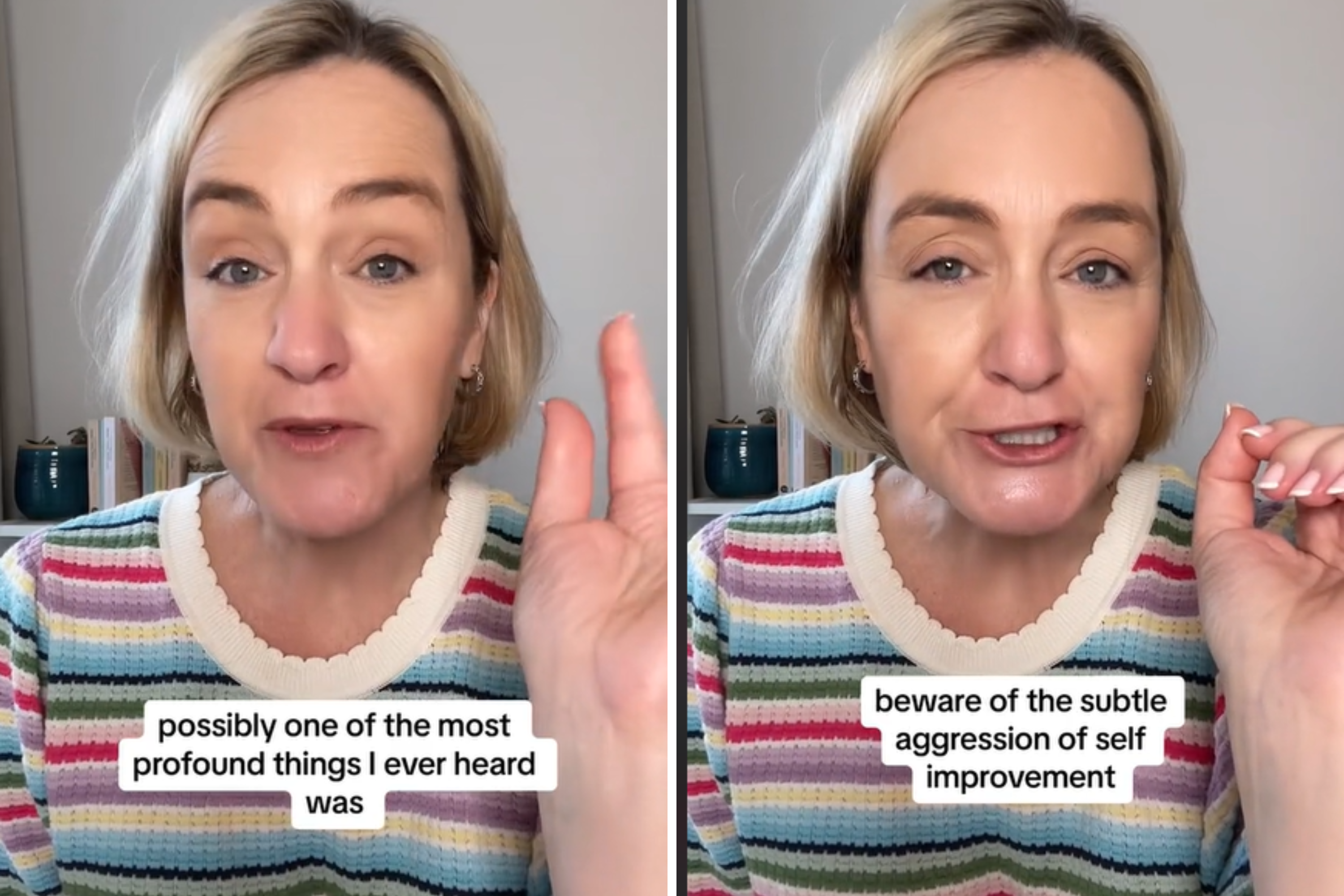A psychologist’s “little epiphany on the massage table” has sparked conversations around why you should beware self-improvement.
Cass Dunn, a clinical and coaching psychologist, shared a profound thing that she told her TikTok audience. She said, “beware of the subtle aggression of self-improvement,” causing many to reevaluate their relationship with self-care.
The 52-year-old Australian, living in London, U.K., added: “If you are really into improving yourself, and mastery, and personal development, and attending courses and reading books, and listening to podcasts… when does it become an attack against yourself?”
Dunn said: “All of this trying to fix yourself and better yourself and improve yourself; for what? When is enough enough?” She then added how genuine intentions have shifted into being unable to meet our own standards and approval.
@cassdunn__/TikTok
Dunn told Newsweek: “I think most of us have a natural instinct toward personal growth, mastery, learning skills, achieving goals and wanting to be the best version of ourselves.
“On one hand, that can be really good for us, but that drive can also lead to us constantly focusing on aspects of ourselves we feel we need to fix, never being satisfied with ourselves or where we’re at in life, and a lot of unhelpful social comparison and self-criticism, which is not great for our mental health or well-being.”
Dunn continued by saying why this push toward constant self-improvement has become such a huge part of our lives: “The emergence of motivational speakers such as Tony Robbins, and others like him, really popularized the idea of achieving extraordinary wealth and success if you just change your mindset, leading people to feel less satisfied with their ordinary lives.
“Then there is social media leading to negative social comparison, because it gives us unprecedented access to the lives of people who are doing much better than we are, and so we find ourselves falling short.”
Information overload from the internet has also caused us to become more aware, and more critical of our own flaws. Dunn said: “Our access to information generally via the internet and self-help books has fed into our very natural desire to strive for happiness and fulfillment by highlighting all our areas of ‘deficiency’ and what we can do to improve.”
It seems this isn’t solely self-inflicted, with market tactics also to blame when it comes to our desire to be improving constantly. Dunn added: “And, of course, advertisers know that selling stuff works better if we believe some aspect of ourselves or our lives will be better if we buy the thing, and we’re bombarded with that message daily.”
With all this to consider, it can be difficult to know how to balance self-improvement without losing who we are and setting unrealistic expectations. Dunn said: “I think the key lies in starting from a place of self-compassion, which is a term initially popularized and studied by psychologist Kristin Neff in the U.S., and essentially means to offer yourself kindness when you are struggling and feeling inadequate.
“It emphasizes our shared humanity; in other words, that we are all imperfect and flawed, and rather than beating ourselves up for that, or pretending we’re not flawed (hello perfectionism, posturing and pretending), we can learn to treat ourselves with the same kindness that we would offer a friend, and show up as our authentic selves.”
For Dunn, self-compassion goes hand in hand with self-acceptance. She said: “When there is self-compassion and self-acceptance, paradoxically, we can still work on aspects of ourselves and our lives that we think would make us feel more fulfilled or satisfied or masterful or confident or whatever, but those efforts are based on an assumption that my worth is inherent. I don’t need to be different to approve of myself, which was the point I was trying to make in the video.”
As to whether self-improvement can result in a negative impact on some, Dunn said: “For some people, yeah, I think it really can. Like everything, things happen by degrees. So, one person might feel very comfortable with their focus on improving certain aspects of themselves or their behaviors and maintain a healthy balance between improvement and acceptance of themselves.
“But, for others, the focus on self-improvement can become relentless and obsessive, leading them to feel chronically dissatisfied with themselves, constantly self-monitoring, spending inordinate amounts of money on books or workshops or courses or products or programs… and ultimately never feeling like they’ve ‘made it.'”
While everyone is on their own journeys and paths, it can be difficult to know where to begin. Dunn has an idea of where to try first. She said: “Sometimes, I think the starting point for self-improvement should be improving our relationship with ourselves and our ability to accept ourselves and know we are enough without fixing anything.”
Dunn finished by saying: “Self-improvement isn’t bad. As a life coach and psychologist, I’m all about supporting people to achieve goals and feel more meaning and satisfaction in their lives, but always from a foundation of self-kindness and your own authentic values.”
Uncommon Knowledge
Newsweek is committed to challenging conventional wisdom and finding connections in the search for common ground.
Newsweek is committed to challenging conventional wisdom and finding connections in the search for common ground.
